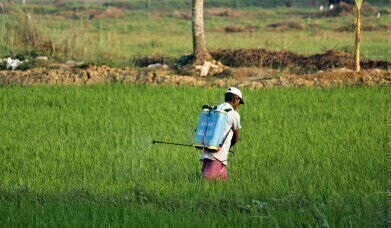Environmental Laboratory
How Do Pesticides Affect the Environment?
Dec 10 2022
Pesticides are commercial products containing toxic chemicals which are deliberately sprayed onto crops in order to deter unwanted pests, such as insects, rodents, fungi and weeds. They encompass a wide variety of chemical products, including herbicides, insecticides and fungicides, among many others.
But while the ability of pesticides to boost crop yields has made them instrumental in producing enough food to satisfy the global population, a surprising percentage (98% of insecticides and 95% of herbicides) do not actually reach their intended their target. Instead, they infiltrate the wider environment, representing just one of many sources and types of agricultural pollution, each of which can have devastating impacts on the world.
Poor quality soil
Although pesticides are meant to help plant growth, over time they can inhibit it. That’s because the chemicals contained within them can reduce the proportion of organic matter in soil, weakening its ability to retain moisture and reducing its overall quality. Not only does this directly damage biodiversity, but it also leads to lower crop yields in the future as it can persist in the environment for many years, building up to unsafe levels in the long run.
Contaminated water supplies
Pesticides can infiltrate streams, rivers, lakes, reservoirs, coastal waters and subterranean supplies through several means: it could leach down through the soil, be carried into waterways via agricultural run-off after heavy precipitation or else spilled during transportation, storage and application. As well as harming aquatic organisms, it can also contaminate drinking water intended for humans. In fact, the UK has performed research using the latest and most sophisticated techniques to show that pesticide content in many rivers and groundwater reserves has reached unsafe levels.
Air pollution
Before it has even had a chance to settle upon the intended crop, a percentage of pesticides is carried away on the breeze. They can also evaporate at a later time or date. Depending on the ambient conditions (temperature, humidity and wind direction), different compounds can behave in different ways and can potentially be carried hundreds of miles away. Certain of these substances are contaminants in their own right, while others can react with particles in the air to form other pollutants such as ground-level ozone.
Bee decline
Although pesticides are intended to target specifically pest plants, animals and fungi, other species can often get caught in the crossfire. Bees are a notorious example of this, with some of the most commonly used pesticides (such as neonicotinoids) now known to cause irreparable damage to bee populations. Due to their vital role as a pollinator, the decline of the global bee population is seriously concerning news for biodiversity around the world.
Animal ecosystems
The use of pesticides can also unintentionally wipe out other plant species which serve as vital sources of food to a variety of different animals. These animals are then forced to either relocate away from their natural habitat in order to find sustenance, or else starve. At the same time, animals which eat plants or insects treated with pesticides could see the substances bioaccumulate in their bodies, thus contaminating the entire food chain.
Digital Edition
Asian Environmental Technology 27.2 - April/May 2023
May 2023
In This Edition Business News - Celebrating The Life Of A Gas Measurement Industry Icon - A New Home For Gas Sensor Specialists - Envea Completes The Acquisition Of Hycontrol Ltd Environ...
View all digital editions
Events
Jul 02 2023 Albena, Bulgaria
Jul 04 2023 Cardiff, UK
Jul 05 2023 Johannesburg, South Africa
Jul 11 2023 Shanghai, China
Jul 11 2023 Lagos, Nigeria



















